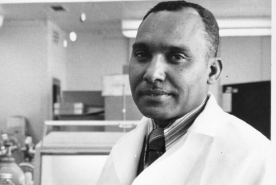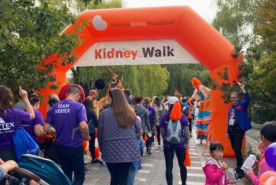September 28, 2023
Continuing education series for professionals.
Creating an open relationship with LGBTQIA+ patients is an ongoing process–there is no one right way to build trust, but these tips are a great place to start.
The importance of inclusive language
Words can make people feel seen and heard or tear them down. They can also have a direct result in helping people change harmful behaviors or fall deeper into them.
For example, one study in Diabetes Care1 found that people with diabetes who experienced stigma from their medical provider were less likely to seek follow-up care and more likely to experience psychological distress. A follow-up assessment showed that they also had elevated A1C and increased blood glucose variability. These measurable, adverse effects of exclusive or demeaning language are why it's so crucial that healthcare practitioners use person-centered, inclusive language for their patients. This includes proper use of pronouns.
"I'm a big believer that our pronouns should accompany your name–when you introduce yourself, give your pronouns. We shouldn't ever assume anyone's gender based on how they look. If someone doesn't give their pronouns the easiest thing to do is just to ask," said Shane Wally, owner of a DEI firm. "We all use pronouns because we want to be lovingly talked about in the third person, and the only way we know how to do that with respect is to either give our pronouns or ask others what their pronouns are."
Here is a list of common pronouns to be aware of:
- She/her/hers
- He/him/his
- They/them/theirs
- Ze/hir/hirs
- Xe/xem/xyrs
- Ver/vir/vis
- Te/tem/ter
- E/em/eirs
It's also important that healthcare professionals choose gender-inclusive language.
"Communicate with the person before they come in. Ask what name and pronouns they'd like you to use," Dr. Sophia Ahmed said. "Avoid gendered terms–for example, don't ask about a wife, husband, girlfriend, or boyfriend. Instead, ask about their partner, discuss parental leave, or fertility concerns. Leave it open so the person feels they can trust you with their medical and social history."
Here is a list of gender-exclusive words and an appropriate replacement:
- Man/women: person/adult
- Girl/boy: child/adolescent
- Husband/wife or boyfriend/girlfriend: partner/significant other
- Ladies/gentlemen: everyone/folks
- Father/mother: parent
- Grandmother/grandfather: grandparent
At NKF, we are committed to putting kidney disease, and its risk factors front and center within the context of health disparities and ensuring the integration of kidney care and the needs of all kidney patients into the public consciousness.
Learn how disparities affect LGBTQIA+ patients and join us in telling OPTN to remove race from the KDRI.
Making your workspace an inclusive environment
As soon as a person walks into the healthcare area, they should recognize that this is a safe place for them to be.
"Nonverbal communication is really important. Having signage that shows people of all genders, sexual identities, backgrounds, race, religion, etcetera are welcome is important," said Dr. Sophia Ahmed, nephrologist and professor at the University of Calgary. "Stickers, pins, flags, pride, and transgender pronoun pins can help convey this."
Gender-neutral washrooms and a safe waiting area where people are called in by their chosen name and not their deadname, the name given at birth, can also increase the feeling of safety in patients.
"Trans and nonbinary people are always trying to bring their full humanity into their doctor's office but that can be scary," said Wally. "Right now many states are trying to stop or block gender-affirming care, increasing people's fear of having these kinds of honest conversations about wherever they are in their medical transition."
Keep learning about what inclusive care feels like.
Assessing the role of gender-affirming hormones and surgery
Gender-affirming care, including hormones and surgery, is incredibly important for many people who do not identify with the gender they were assigned at birth. However, no evidence-based guidelines exist for gender-affirming hormones, kidney disease, or immunosuppressive medicines for transplant recipients.
"A lot of research needs to be done in this area. We don't have a clear understanding of interactions between immunosuppression medication and hormones," said Dr. Sylvia Shaw, a transplant nephrologist. "I recently had a conversation in the living donor evaluation clinic where a patient on progesterone was asked to stop taking it and their kidney function improved. Still, the literature is not clear on how these hormones impact kidney function."
Going off their hormones can be challenging as the patient’s transition may stop or reverse. So, how do you balance the potentially competing needs of a patient?
"People are having to make hard decisions between their transition and kidney health, which could be life or death. For me, I would want to be with a healthcare provider who's willing to have a conversation. I wouldn't want to be told my health is more important because my safety and identity can rest on looking in the mirror and seeing a person who reflects me. There might also be a time where you'll need to consider the timing of things for someone planning a gender-affirming surgery," said Wally. "These are tough conversations, so be willing to have kindness and compassion if people are resistant to stopping their hormone treatment."
Take the Optimizing Kidney Health Care for LGBTQIA+ Patients test to earn your CE credit.
Earn CE on the go
Listen and earn CE as our panelists delve into the subjects that matter most to you while offering in-depth clinical updates and real-world examples of these changes. Subscribe to The Kidney Commute Podcast.
Sources
1 Jane K. Dickinson, Susan J. Guzman, Melinda D. Maryniuk, Catherine A. O’Brian, Jane K. Kadohiro, Richard A. Jackson, Nancy D’Hondt, Brenda Montgomery, Kelly L. Close, Martha M. Funnell; The Use of Language in Diabetes Care and Education. Diabetes Care 1 December 2017; 40 (12): 1790–1799. https://doi.org/10.2337/dci17-0041









